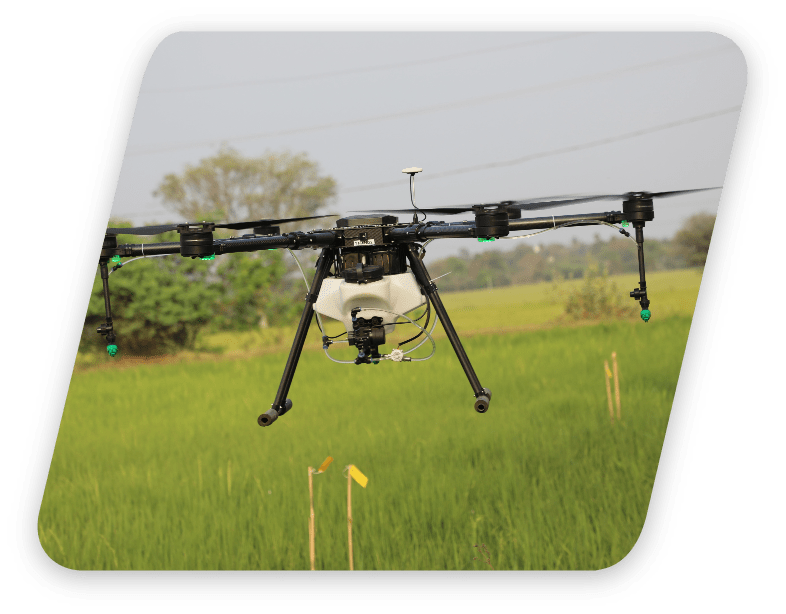Sprayer Drone by Thanos
Autonomous
Efficient
Safe

Despite significant technological advances in various domains in India, agriculture still lags behind in technology adoption. While various agri-mechanization technologies are being introduced, financial products are being launched, and supply chain issues are being addressed, we believe that there is a lot more room for improvement in the status quo through the adoption of technologies that some countries around the world are already benefiting from.

34 million farm labourers left agriculture between 2005 and 2012

Time-consuming and non-uniform spraying increases costs and reduces yield.

More than 50% of the spray goes to non-target areas or ends up on the ground.
Most tasks in agriculture are inherently arduous. When you add the challenge of declining manual labor availability and the inherent hazards of certain chemicals, such as pesticides, it becomes increasingly difficult for farmers to carry out agricultural spraying effectively and safely.
We focused on solving these problems and developed a much-needed product, SYENA – our UAV-based Agricultural Spraying Platform. Below is a brief comparison of manual vs. UAV-based spraying methods:
Manual Spraying
Drone Spraying
Coverage
1 Acer/Hour
6/8 Acer/Hour
Water Saving
-
Up to 80%
effectiveness
Non-uniform spraying
Uniform spraying
Cost per use
₹₹₹
₹₹
Safety
Direct exposure to chemicals
No direct exposure to chemicals
Chemical Usage
Over use of chemical
Uses recommended dosage
At THANOS, we’ve developed Agricultural Spraying Drones in various capacities: 5 Litres, 10 Litres, and 15 Litres. After nearly 3 years of trials, demonstrations, and field operations, we’ve found that 10 Litres (or 10 Kg) is the ideal capacity for Agricultural Spraying Drones. We considered factors such as battery capacity, flight time, ease of transport, and spraying efficiency in arriving at this conclusion. With that introduction, we’d like to present our 10 Litre Agricultural Spraying Drone, SYENA-H10. You can see it in action over four different crops in the video below:
S.No.
Parameter/Feature
Specification
1
Type
Multicopter Hexacopter X
2
Dimensions (Propellers Folded Inwards)
Folded (Mm): 900 X 750 X 625 Open (Mm): 1700 X 1500 X 710
3
Payload Capacity
10 Litre / 10 Kg (Whichever Is Less)
4
All Up Weight (With 10 Kg Payload)
29.4 Kg
5
Category (As Per Dgca)
Medium
6
Flight Time
Upto 20 Minutes With Depleting Payload
7
Battery Charging Time
60-75 MinutesX
8
Spray Width
3 – 5 Metres
9
Flight Mode Options
Manual / Semi-Autonomous / Autonomous
10
Wind Resistance
Level 5 As Per Beaufort Scale
11
Flight Speed
Upto 10 M/S (Recommended Upto 5 M/S)
12
Frame Material
3 K Carbon Fibre
13
Other Features
Gps And Radar For Uniform, Efficient & Precision Spraying – Continuous Operation Data Monitoring
The SYENA-H10 has undergone multiple seasons of trials and covered thousands of acres in spraying pilots and demonstrations over the past 5 years. It has been optimized for continuous field operations. The following are the work rate capacities of the SYENA-H10:
Please note that these work rates are estimates based on assumed spray volume rates for 5 hours of daily operation. They should not be considered as dosage recommendations for spraying. The correct spray dosage should be confirmed with the agri-chemical manufacturing company or the local distributor before commencing any operations.